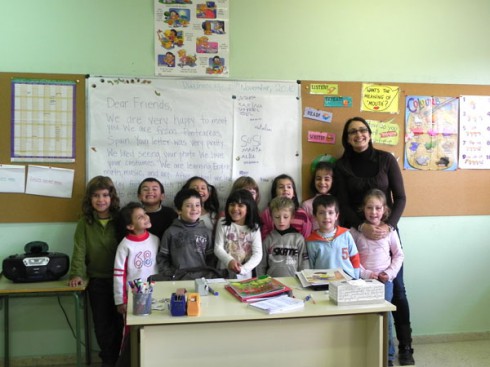 I assist in teaching 3 through 11-year-olds in my school. This is my first grade class with the English teacher Nuria. She is a wonderful teacher and has been a pleasure to get to work with! She even bought me peanut butter because she heard me mention I missed it! This was taken in front of the letter we wrote to our pen pal class with my friend's (Amy Klinner's) class in Texas.
I assist in teaching 3 through 11-year-olds in my school. This is my first grade class with the English teacher Nuria. She is a wonderful teacher and has been a pleasure to get to work with! She even bought me peanut butter because she heard me mention I missed it! This was taken in front of the letter we wrote to our pen pal class with my friend's (Amy Klinner's) class in Texas.
I have thoroughly enjoyed teaching. It has been quite a shift from the design world that I'm used to, but I have found many interesting parallels. As an Irish pilot friend I met in Greensboro put it, I'm "conveying info (designer's job) the old school way by teaching." And in many ways it is. You must design the way you present information whether that's visually or just how you approach the subject with the students. I am eager to continue in life with my investigations into the role of design in education--to explore what types of designed information allows for maximum comprehension and information attainment.
One thing I've noticed about the school system here that is quite contrary to that of the States is that teachers love their jobs and continuously tell me how lucky they are to have a great job. I know teachers in America who "love" their jobs, but it's rare that they would ever boast about what a "great" job is it. If I'm correct, I remember teachers feeling under-valued, under-rated, and under-paid. They might love the impact they can have on students, but certainly do not think that it is compensated well or comes with good benefits. It is a government job which I assume comes with a little more security and long-term benefits. But in Spain teachers have extreme job security, get paid very well, and have wonderful benefits. The nation seems to value the potential their teachers have to make them a world competitor. Even in the fact that this language assistant program exists. I am here with a government program that has placed over 1200 native English (and some French, German, and Chinese teachers) in their schools so that their students can learn native accents (my poor kids learning Alabama English!). A funny side-note on that is that the materials we use in class is all British-based English. I often feel like I'm confusing my kids because they have learned words with British accents like, "I cahn go...," "I move my ahms." And words like "ladybird" instead of ladybug, "trainers" instead of tennis shoes, "rubber" instead of eraser, etc. Back to my point. Katie and I have often thought, "Wow, it seems like a waste of money for their government that we play with three-year-olds and teach them colors, numbers, animals, etc. Seems like they could put their money to better use elsewhere." But the thing is, they know if their children can master English with a decent accent, they will be immensely more empowered as a nation and individuals to be world competitors. At first this sounds bad because it seems like English is taking over the world. But it's not like their native languages are dying. The region has made huge efforts to preserve the native Galician language in addition to Spanish. So in the schools the children, by law, learn Spanish, Galician, and English. Three languages from three-years-old!
I just read an article in the NY Times today about education in America by one of my favorite writers, Thomas Friedman. He profoundly calls the "epicenter of national security" the Education Department. He notes that (I am making no political statements here on leaders or parties): "President Obama got this one exactly right when he said that whoever 'out-educates us today is going to out-compete us tomorrow.' The bad news is that for years now we’ve been getting out-educated. The good news is that cities, states and the federal government are all fighting back. But have no illusions. We’re in a hole." He says that "if you look at the countries leading the pack in the tests that measure these skills (like Finland and Denmark), one thing stands out: they insist that their teachers come from the top one-third of their college graduating classes. As Wagner put it, 'They took teaching from an assembly-line job to a knowledge-worker’s job. They have invested massively in how they recruit, train and support teachers, to attract and retain the best.'” South Koreans even go so far as to "refer to their teachers as ‘nation builders.’ ” Incredible. And true. If you educate a nation, you prevent poverty by empowering a workforce, you fight terrorism by building up citizens who aren't vulnerable to inculcation of dangerous values, you eradicate racism by promoting understanding, and you preserve your nation's heritage and history and build on it by making culture within the walls of schools. He then ends on a reminder note that education starts in homes. Parents must first value education so that there is pressure on the government to start investing in it more.
Thankful for the parents and teachers who took time to teach me.
